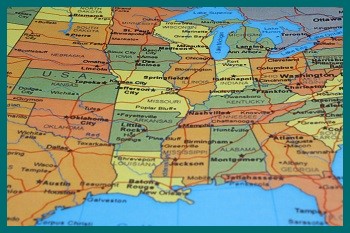Compact Nursing States: What You Need to Know
Are you a RN or LPN that’s licensed to work in compact nursing states? If so, we have some amazing job opportunities for you! Find out more about our travel nursing contracts.
What Is the Nurse Licensure Compact?
 When it comes to compact nursing states, it’s important that you first understand the Nurse Licensure Compact (NLC).
When it comes to compact nursing states, it’s important that you first understand the Nurse Licensure Compact (NLC).
According to the National Council of State Boards of Nursing (NCSBC), the NLC “allows a nurse to have one multistate license with the ability to practice in the home state and other compact states.”
That sounds great! But what does it really mean?
In plainer language, the NLC is an agreement between certain states. This agreement allows nurses holding a valid license in a participating state to practice nursing in every other participating state. In essence, the NLC is a multistate nurse licensing system.
For example…
Nurse Jane lives with her partner and family in Alabama, a compact nursing state. Her significant other has accepted a short-term job assignment in Wisconsin, also a compact nursing state. Since Alabama and Wisconsin are both compact nursing states, Nurse Jane does not need to obtain a new license to temporarily work in Wisconsin.
The NLC is governed by the NCSBN. In 2018, the NCSBN adopted an updated version of the NLC, called the Enhanced Nurse Licensure Compact (eNLC). The eNLC further simplified the process for obtaining and holding a multistate license. While all this terminology can be overwhelming, just know that “NLC,” “eNLC,” “compact license” and “multistate nursing license” are all terms that are used interchangeably.
Presently, the eNLC only governs multistate nursing licenses for registered nurses (RNs) and licensed practical/vocational nurses (LPNs/LVNs). However, the NCSBN is working on a compact agreement for advanced practice registered nurses (APRNs). This agreement will be implemented after 10 states enact the appropriate legislation.
Current Compact Nursing States
As of June 2021, there are 35 compact nursing states. They include:
| • Alabama | • Louisiana | • Oklahoma |
| • Arizona | • Maine | • South Carolina |
| • Arkansas | • Maryland | • South Dakota |
| • Colorado | • Mississippi | • Tennessee |
| • Delaware | • Missouri | • Texas |
| • Florida | • Montana | • Utah |
| • Georgia | • Nebraska | • Vermont (effective: 02/2022) |
| • Idaho | • New Hampshire | • Virginia |
| • Indiana | • New Jersey | • West Virginia |
| • Iowa | • New Mexico | • Wisconsin |
| • Kansas | • North Carolina | • Wyoming |
| • Kentucky | • North Dakota |
Additionally, our nation’s ongoing nursing shortage has cast a bright spotlight on the need for decreased regulatory burdens on nursing licensure. Ten states now have pending legislation for the eNLC. They include:
How to Apply for a Compact License
Before we dive into the application process, we must first clarify an important term: primary state of residence (PSOR).
According to NCSBN, the PSOR “is not related to property ownership in a given state. It is about your legal residency status.” Sources that prove/verify your PSOR include your:
- Driver’s license;
- Voter’s card;
- Federal income tax return;
- Military form no. 2058; or
- W2 from your PSOR.
FYI: If a nurse’s PSOR is a compact nursing state, that nurse may be eligible for a multistate nursing license. However, if a nurse’s PSOR is not a compact nursing state, that nurse would not be eligible for a multistate nursing license.
In addition to living in and claiming one of the compact nursing states as your PSOR, you will also need to meet the following criteria to receive a compact nursing license:
 1. Have graduated from a board-approved education program or from an international education program (approved by the authorized accrediting body in the applicable country and verified by an independent credentials review agency);
1. Have graduated from a board-approved education program or from an international education program (approved by the authorized accrediting body in the applicable country and verified by an independent credentials review agency);
2. Have passed an English proficiency examination (applies to graduates of an international education program not taught in English or if English is not the individual’s native language);
3. Have passed an NCLEX-RN® or NCLEX-PN® Examination or predecessor exam;
4. Be eligible for or hold an active, unencumbered license (i.e., without active discipline);
5. Have submitted to state and federal fingerprint-based criminal background checks;
6. Have not been convicted or found guilty, or have entered into an agreed disposition, of a felony offense under applicable state or federal criminal law;
7. Have no misdemeanor convictions related to the practice of nursing (determined on a case-by-case basis);
8. Not currently a participant in an alternative program;
9. Self-disclose current participation in an alternative program; and
10. Have a valid United States Social Security number.
After meeting all the criteria listed above, you can go to your state board of nursing website and apply for a multistate nursing license. Once your application is reviewed and approved (a process that typically takes 3-7 business days), you will receive your eNLC license in the mail.
What if You Live in a Non-Compact State?
 As previously mentioned, if your PSOR is not in the NLC, you will not be able to obtain a compact nursing license. However, you can still apply for a nursing license in a compact state. The license that you would receive would only be good for that state. There are no limits on the number of single-state licenses that a nurse can have.
As previously mentioned, if your PSOR is not in the NLC, you will not be able to obtain a compact nursing license. However, you can still apply for a nursing license in a compact state. The license that you would receive would only be good for that state. There are no limits on the number of single-state licenses that a nurse can have.
Additionally, if you were to move from a noncompact state to a compact state, you would then become eligible to apply for a multistate license. However, you would still need to meet the “new” state’s residency and eligibility requirements first.
Whether you have a compact nursing license or not, you can still have a very successful career as a nurse. Healthcare staffing agencies, like Premier Medical Staffing Services, are used to working with clinicians with diverse backgrounds and licensure. If you’d like to further explore what career opportunities are available to you, we’d love to chat. Click here to have one of our placement specialists contact you.
Compact Nursing States Resources
Looking for additional information on compact nursing states? Check out these resources from NCSBN: